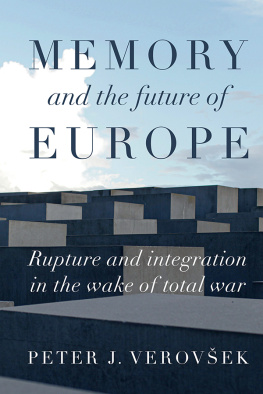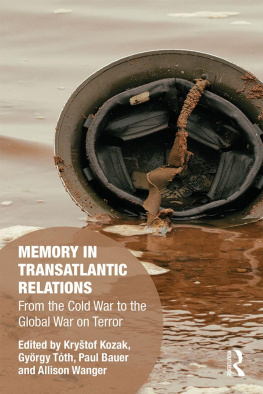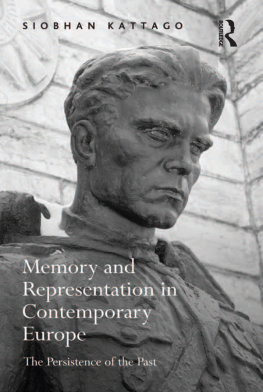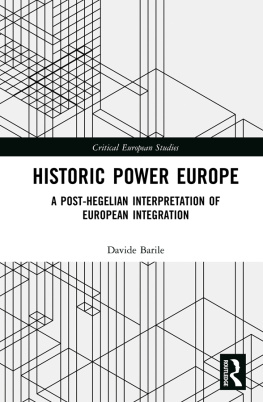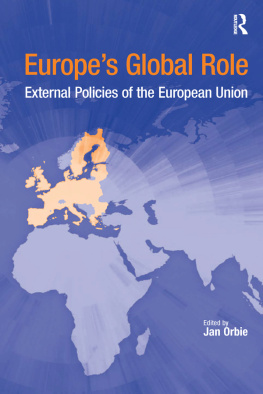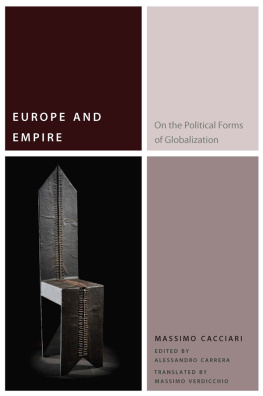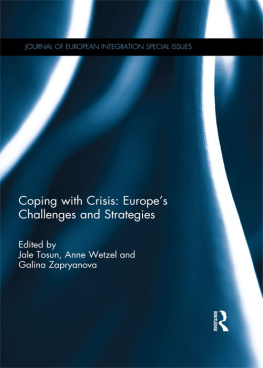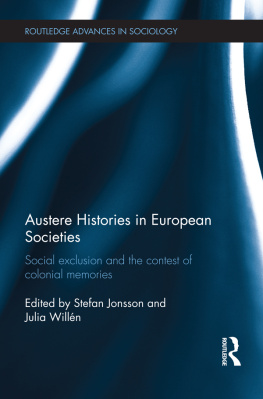Copyright Peter J. Verovek 2020
The right of Peter J. Verovek to be identified as the author of this work has been asserted by him in accordance with the Copyright, Designs and Patents Act 1988.
Published by Manchester University Press
Altrincham Street, Manchester M1 7JA
www.manchesteruniversitypress.co.uk
British Library Cataloguing-in-Publication Data
A catalogue record for this book is available from the British Library
ISBN 978 1 5261 4310 5 hardback
First published 2020
The publisher has no responsibility for the persistence or accuracy of URLs for any external or third-party internet websites referred to in this book, and does not guarantee that any content on such websites is, or will remain, accurate or appropriate.
COVER IMAGE: Memorial to the Murdered Jews of Europe, Berlin, Germany. Rob Pinney
Typeset by Newgen Publishing UK
Any project that takes ten years to complete racks up an impressive number of debts along the way. Over the past decade I have lived and conducted research in numerous locations and received the generous assistance of countless friends and colleagues. Unfortunately, due to constraints of space and the deficiencies of my own memory, it is impossible to list them all. My apologies in advance to those who I have unintentionally left out!
I started to conceptualise this project at Yale University in the fall of 2009. At that point I hoped to write a book examining the role of collective memory in political life using the origins and development of the European Union since 1945 as an illustrative case study. Although the subprime mortgage crisis had already started in the United States, it still looked as though Europe had managed to avoid the contagion emanating from the other side of the Atlantic. However, by the time I had started to work on the project in earnest in the spring of 2010, Greeces difficulties financing its sovereign debt had already set off the crisis of the Eurozone, which would ultimately threaten the future of the European Union as a whole.
As a result of these events, the reflective, backward-looking, and optimistic manuscript I had planned to write about the ability of collective memory to help individuals and communities learn the lessons the past, became much more politically relevant, forward-looking, and pessimistic. Thinking and writing in the shadow of a series of existential threats to the EU from the problems of sovereign debt in Greece in 2010 to Brexit in 2016 and the striking electoral success of far-right populists in the EU parliamentary elections of 2019 I found that the idea of crisis had come to play a central role in my thinking. A project that was originally supposed to be about the transformational power of the collective memory of what I call the rupture of 1945 ultimately became a book that had to seriously contemplate what the loss of this transnationally shared remembrance meant for European politics at a time when the generations of experience were beginning to pass away. I was also forced to reflect on the role that collective remembrance could play in combating the return of nationalism on a continent that had suffered through two world wars brought about by this ideology in the first half of the twentieth century.
Luckily, I was well-prepared to undertake this work, which combined research in collective memory studies with the critical theory of the Frankfurt School. I initially became interested in collective memory when I had the opportunity to help my undergraduate advisor, Richard Ned Lebow, edit a volume on The Politics of Memory in Postwar Europe (Duke University Press, 2006) as a Presidential Scholar in the Government Department at Dartmouth College. At that same time I was receiving my introduction to the Frankfurt School and to continental philosophy more generally from Amy Allen in the Philosophy Department.
Although the discipline of political science is a relative latecomer to the study of collective memory, I found a lot of support within the discipline during my time at Yale. Seyla Benhabib deserves particular thanks for taking me under her wing. She was instrumental to my development as a scholar and infinitely supportive of my desire to pursue a somewhat unorthodox project combining political theory, international relations, collective memory studies, and history. She deserves much of the credit for whatever merits this book might have.
Bryan Garsten and Adam Tooze also played crucial roles. As a political theorist, Bryan helped me to ensure that this book would appeal to a philosophical audience despite its interdisciplinary nature. He was also a valuable source of support throughout my work, generously giving his time to talk through minor details with me. By contrast, Adam provided me with the perspective of a twentieth-century historian, guiding me through the process of historical and archival research. I am also grateful to other faculty I consulted with at the Department of Political Science during my time at Yale, especially Keith Darden, Stathis Kalyvas, Jolyon Howorth, and Jim Scott. Bruno Cabanes and Jay Winter, both of the History Department, as well as Ron Eyerman of Sociology, were also important sounding boards for my ideas.
It is often said that we learn as much from our peers as from our teachers. That was certainly true in my case. Although there are too many to name, Matthew Longo, Luke Thompson, Lucas Entel, Onur Bakiner, Anna Jurkevics, Erin Pineda, Paul Linden-Retek, Stefan Eich, Kim Lowe Frank, Jennifer Wellington, and Jensen Sass were all generous with their time and attention in helping me to develop my ideas. I am also grateful to the participants at the Yale Political Theory Workshop, where I was able to present this work in its earliest incarnations.
This project builds on a substantial amount of historical and archival research, which required a lot of travel and substantial amounts of funding. I would like to thank the MacMillan Center and the EU Studies Council at Yale for their financial support. I conducted the majority of my archival research during a stay at the Fondation Jean Monnet pour lEurope in Lausanne, which was generously funded by the Fondations Bourse Henri Rieben. I owe a debt of gratitude to the director of the Centre, Gilles Grin, as well as Franoise Nicod, the head of the archives at the time, and Philippe Klein, who was always ready to fetch new documents for me to examine.
I am also grateful to Rainer Forst, who hosted me twice in Germany, first at the Excellence Cluster The Formation of Normative Orders at the Goethe-Universitt Frankfurt am Main, which was possible due to the support of the German Academic Exchange Service (DAAD). He later invited me back as Junior Fellow at the Institute for Advanced Studies in the Humanities (Forschungskolleg Humanwissenschaften) in Bad Homburg, courtesy of the Alphons and Gertrude Kassel Foundation. I would like to thank all of the participants of Rainers research group, especially Erin Cooper, as well as the fellows at the Forschungskolleg during my stay there for their thoughtful comments and support.
After leaving Yale I was lucky to get a job teaching at the Committee for Degrees in Social Studies at Harvard University. The staff and my colleagues there especially Anya Bernstein Bassett, Katie Greene, Jonathan Hansen, Bonnie Talbert, Angela Maione, and Ian Story provided wonderful support as I worked on this book while also carrying a full teaching load and searching for a tenure-track position. Although we stand on opposite sides of the debate about the EU, Richard Tuck was a wonderful debating partner and a great supporter of my work. Additionally, I greatly enjoyed discussing my ideas about critical theory and European politics with Peter Gordon. I am also grateful to my colleagues at the Minda de Gunzburg Center for European Studies, especially Art Goldhammer, Vivien Schmidt, and Karl Kaiser, for including me in the intellectual life of the Center.

